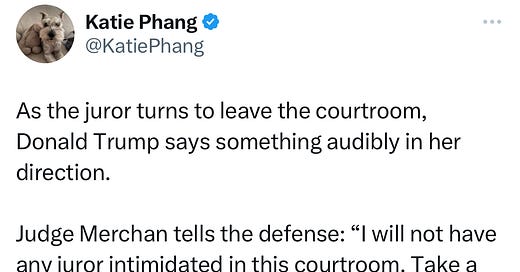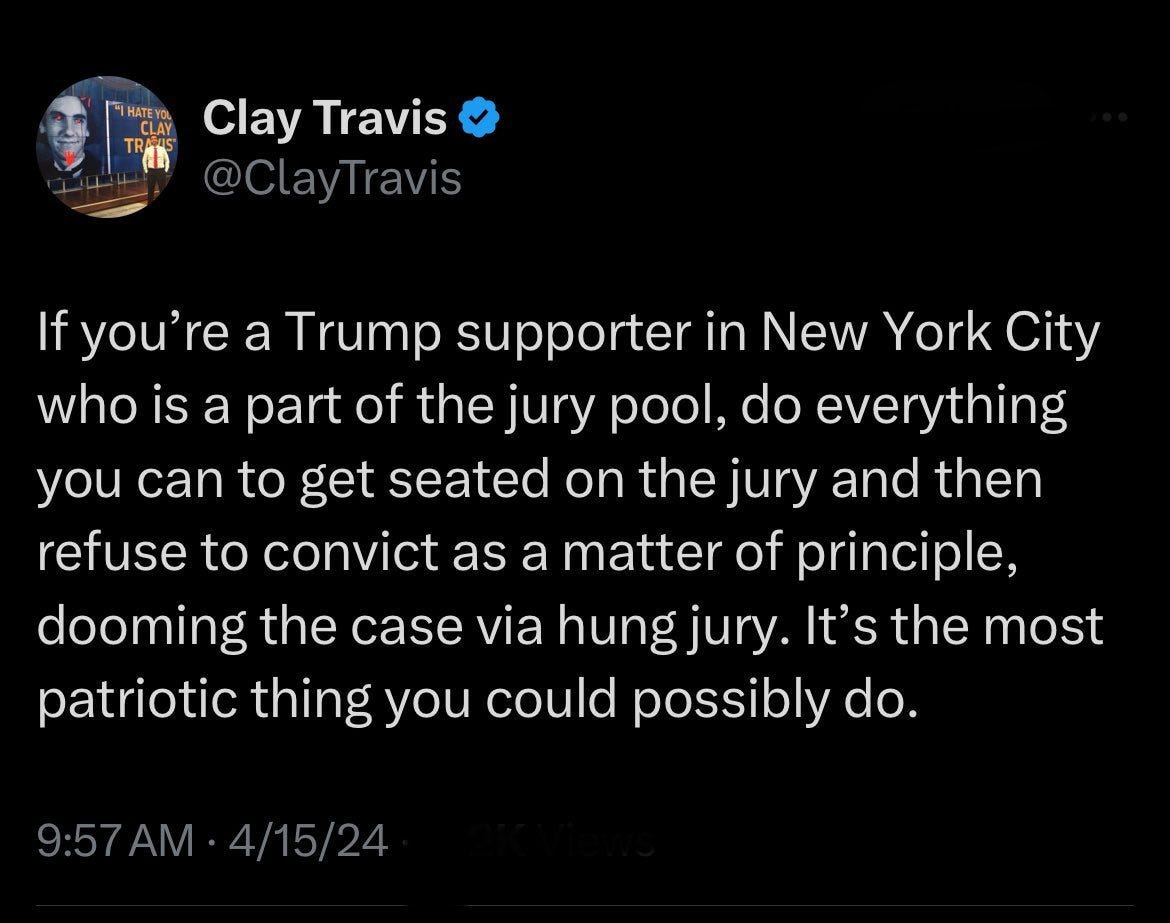Here's where we are at the end of the day: Seven jurors have been selected to serve on the jury. The remainder will be selected from 96 people who will return to the courthouse on Thursday morning when jury selection continues.
That’s not bad for just over a day and a half of jury selection. Many people were predicting it could take weeks. My feeling this morning, when Preet Bharara and I taped The Insider Podcast, was that it would be about a week, maybe plus a few extra days. It looks like I may have been on the long side. Each side used up six of their peremptory challenges to get to this point, so they’ll be able to exclude fewer jurors from this point on, unless they can get the Judge to agree to remove them for cause.
Trump was able to remove two jurors on that basis today, both after his lawyers raised social media posts that suggested, in one instance, that Trump should be behind bars. But the Judge cautioned that not every social media post that showed disagreement with Trump was sufficient to establish that a potential juror could not be fair and impartial. One juror, who posted a video of a post-2020 election celebration, explained she had done it both because it documented an important historical event and because it reminded her of the daily celebrations in New York City honoring first responders during the COVID pandemic. The Judge refused to strike her for cause, and Trump’s team had to spend a peremptory challenge to keep her off of the jury.
The jury will be complete when 12 jurors and six alternates have been selected.
The Judge cautioned Trump once today about intimidating jurors. Or, more precisely, he told Trump’s lawyers to have a talk with their client. Trump would do well to sleep more in court if this is the best he can manage when he’s awake. Expect the Judge to try and get through jury selection ahead of next Wednesday’s scheduled hearing on Trump’s gag order violations, at which point, all of this may come to a head.
As we've discussed previously, the dynamics of jury selection are very different depending on which side of the courtroom you're on. The defendant is looking for holdout jurors. It’s different for the prosecution. They have to be able to convince every juror that their evidence is proof of guilt beyond a reasonable doubt in order to get a conviction. They are looking to remove people who they believe won’t give them a fair shake. Lawyers often look at juries once they’re selected—prosecutors are notorious for this—and obsess about “juror number eight who crossed his arms over his chest tightly every time I spoke” and so on. But the reality is that for both sides, and especially on the prosecution side, you never get a perfect jury. You have to have confidence in the process and that 12 ordinary Americans who take an oath will honor it, that they will listen to the evidence and decide the case fairly.
Lest you think that's not possible, remember that Paul Manafort was convicted by a jury that included people who counted themselves among Trump’s base. One of them told reporters afterward that although she supported the then-president, she had listened to the evidence and was persuaded that Manafort was guilty, so she voted to convict.
There has been lots of talk about the possibility of a stealth juror—someone who pretends to be neutral but who, once seated on the jury, will refuse to vote to convict no matter how strong the evidence is. Yes, that’s an inherent risk prosecutors confront in our system—that a juror with a hidden agenda might lie their way onto a jury. There is a movement for jury nullification whose advocates encourage jurors to insert their own sense of justice in place of the laws they disagree with and refuse to convict even when there is incontrovertible evidence of guilt. Prosecutors use their skills to try and detect these jurors and prevent them from being seated on the jury. The prosecutors involved in jury selection in this case have the combined experience for this.
But it’s also a reality that in this unlike-any-other case, Trump supporters are publicly soliciting potential jurors to protect him, like Podcaster Clay Travis who has been vocal on this point. Florida Congressman Byron Donalds, a Republican who apparently has vice presidential aspirations on the Trump ticket, also encouraged jurors to vote not guilty. New York law prohibits conduct designed to influence the outcome of a proceeding through communications with a juror or a potential juror.
The goal for Trump’s team is a jury that can’t reach a verdict, a jury that “hangs.” In the event that happens, before a mistrial is declared, the Judge would give a deadlock instruction. We use something similar called an Allen charge (named after the court case that authorized the use of this procedure) in the federal system, and I have seen it be very effective with juries that appear to be hopelessly deadlocked until they hear from the judge.
The New York instruction reads, in part (it’s quite lengthy): “It is not, however, uncommon for a jury to have difficulty initially in reaching a unanimous verdict, and it is not uncommon for a jury to believe that they will never be able to reach a unanimous verdict. But, after further deliberations, most juries are able to reach a unanimous verdict. And, so, I will ask you to continue your deliberations. But before I do, I want to remind you that, when this trial began, many prospective jurors were called and questioned. Many were excused for one reason or another. But you ladies and gentlemen were selected to serve. That means that of all the prospective jurors called in this case, you were the ones in whom both sides expressed confidence. Both sides were convinced that each of you would be fair and impartial, that each of you would listen carefully to the evidence, to the arguments, and to the law, and that each of you would deliberate with your fellow jurors and work hard to reach a unanimous verdict that was consistent with the law and the evidence. Both sides continue to have confidence in you, as do. Members of the jury, you make up a very good jury. There is no reason to believe that the presentation of this case again would be to a jury that is any more intelligent, reasonable, hardworking, or fair than you are. I want to emphasize that I am not asking any juror to violate his or her conscience, or to abandon his or her best judgment. Any verdict you reach must be the verdict of each juror, and not mere acquiescence in the conclusion of others. But I am asking you to continue deliberating, and to resume your deliberations with an open mind. Start with a fresh slate. Do not feel bound by how you felt before — whether you favored conviction or acquittal. Have the courage to be flexible. Be willing to change your position if a reevaluation of the evidence convinces you that a change is appropriate. Do not, out of pride or stubbornness, adhere to an opinion or conclusion that you no longer believe is correct. Be honest with yourselves and with the other jurors. Listen to the other jurors and evaluate what they have to say. Do not let anything prevent you from carefully considering what they say. Remember that each of you made a commitment when you became a juror that requires you to reason and deliberate together to reach a fair and a just verdict based only on the evidence.”
The admonition that no other jury would be in any better position to decide the case than they are and that they have an obligation to do their job often, but not always, hits the mark. In Trump’s case, not only must jurors must take an oath to serve, the public will learn what that evidence is and whether it is strong or not. And the jurors will have to deliberate as a group, which will lay bare anyone who refuses to deliberate in good faith. In a case like this one that will garner attention long after it’s over, fellow jurors would expose one of their number who unreasonably refused to convict. The threat of that story being public may also work to discourage stealth behavior on this jury.
I’m a believer in the jury system and have seen it do justice time and time again. It is not perfect, and given Trump’s success at manipulating the legal system, prosecutors would do well to remain on guard. But there are encouraging signs among the jurors who have been selected so far.
That is precisely how we are entitled to expect this to work.
We’re in this together,
Joyce







The Oompa Loompa's Lament
There's no earthly way of knowing
Which direction we are going
There's no knowing where we're rowing
Or which way the trial is flowing
•
Is it raining, is it snowing?
Is a hurricane a-blowing?
Not a speck of light is showing
So the danger must be growing
•
Are the fires of Hell a-glowing?
Is the grisly reaper mowing?
Yes, the danger must be growing
For the lawyers keep on rowing
•
And they're certainly not showing
Any signs that they are slowing
Donald's ego keeps on crowing
As his grip on power's slowing
•
Round and round in circles spinning
Donald's lies keep on beginning
Judge Merchan's patience thinning
As the trial keeps on winning
•
In Room 1530, history's made
Donald's crimes on full parade
Parker warning, rules are laid
But his narcissism can't be swayed
•
Cameras banned, a travesty
Justice hidden from you and me
Donald's spin, a comedy
Of lies and mediocrity
•
Jurors serious, facts they find
Despite the MAGA crowd's combined
Efforts to subvert and blind
The truth, they cannot unwind
•
Double, triple, quadruple down
Donald pushes, the world's his town
But now the law has come around
To bring the king without a crown
•
To testify or not to be
That is the question, we shall see
If Donald's hubris sets him free
Or seals his fate in infamy
•
Alone he sits, no family near
Melania, children, nowhere here
Transactional, their love so dear
When power fades, they disappear
•
Boredom, disrespect, control's loss
Donald's psyche pays the cost
Unremitting, his mind's accost
As he faces his demons, long since crossed
•
Rallies, his fix, he'll surely seek
After hours in court, so bleak
His narcissism, springing leak
As inevitability's peak
•
Draws ever closer, day by day
The piper's tune, he must now pay
For decades of deception's sway
In Merchan's courtroom, no delay
•
The danger's growing, row by row
As Donald reaps what he did sow
Justice's hand, so sure and slow
Will guide this trial, high or low
•
To its conclusion, come what may
In SheScribe's style, we now convey
This zany rhyme, in court's array
Donald's fate, on full display!
I believe a fair enough jury can be found. Why? I am an activist here in my county for Democratic candidates. I knock hundreds of doors every election. The one thing that’s true in every neighborhood is how utterly uninformed people are. So if their source of information is what they hear in the courtroom, possibly we find reasonable people in there. (Which wouldn’t be me, but I mean most people.)